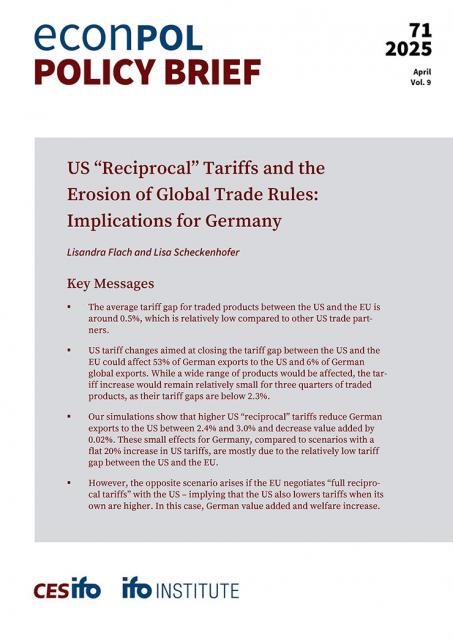News Archive

Fiscal Rules Post-COVID: Using the Recovery Phase to Reduce Debt Ratios
|
EconPol Opinion
| News
The Commission has recently launched a review of the economic governance rules. One reason for this (re-)launch is that it is widely assumed that the debt reduction criterion cannot and should not be enforced when the suspension of the fiscal rules motivated by the Covid crisis ends. The main reason given is that debt levels have increased and that this makes it more difficult to reach the debt reduction target, which is one twentieth of the difference between the actual and the 60% reference value. However, this argument is wrong.

Labour Market Power and the Quest for an Optimal Minimum Wage: Evidence from Italy
|
Working Paper
| News
This paper investigates the recent trends in labor market power in Italy and assesses the impact of a potential minimum wage using a large sample of manufacturing firms. The authors show that, despite a general shift of labor market power from the employer to the workers, monopsony power is still widespread, especially in certain sectors and regions. The introduction of a minimum wage would be beneficial to the economy as it reduces the monopsony power of highly productive firms that pay low wages.

60%, -4% And 6%, a Tale of Thresholds for EU Fiscal and Current Account Developments
|
Working Paper
| News
- Read more about 60%, -4% And 6%, a Tale of Thresholds for EU Fiscal and Current Account Developments
This paper investigates the relationship between the budget balance and the current account balance for European Union countries with a quarterly data set from 1995 to 2020, using various time series and panel data empirical methodologies. The analysis shows that the impact of the budget balance on the current account balance is greater for those Eurozone countries with an average current account balance-to-GDP ratio outside the range of -4 to 6%, and in Eurozone countries with debt-to-GDP ratios above 60%.

Conference Videos Now Available
|
EconPol Annual Conference
| News
Videos of our annual conference 2021 are now available to view on our conference website. Videos include the opening keynote speech from Olivier Blanchard, Senior Fellow at the Peterson Institute for International Economics, the keynote speech from Daniel Gros, Distinguished Fellow at the Centre for European Policy Studies, and our panel discussion on Fiscal Policy for the Post-Covid Era - US vs EU with Clemens Fuest, Claudia Sahm, Debora Revoltella and Maarten Verwey.

Daniel Gros: “Policymakers Should Consider High Public Debt Ratios as a Risk”
|
EconPol Annual Conference
| News
Daniel Gros, Distinguished Fellow at the Centre for European Policy Studies, will speak about the dangers of high public debt in his afternoon keynote speech at the EconPol Annual conference. He cautions countries with high debt ratios not to rely on low interest rates to make their (Covid-19) debt sustainable. His speech is based on a most recent EconPol Policy Brief that will be released on the day of the conference.
